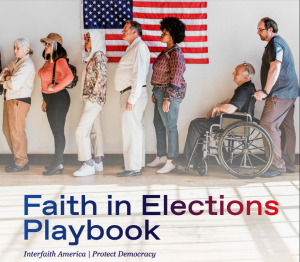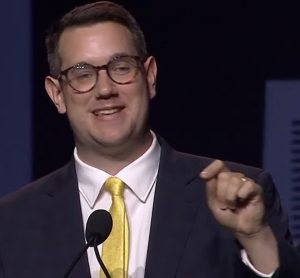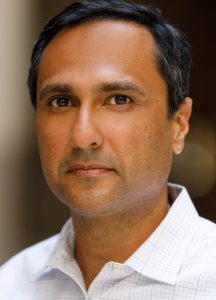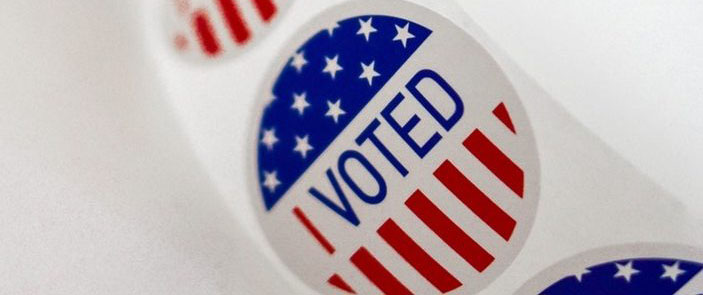A national interfaith group and a cross-partisan democracy nonprofit have partnered to create a comprehensive online guide to faith-based involvement in the 2024 primaries and general election.
The “Faith in Elections Playbook” provides detailed instructions congregations and other religious groups can use to help bridge partisan and community divides throughout next year’s election season, according to co-developers Interfaith America and Protect Democracy.
The resource “is a step-by-step guide for people of faith to bridge community divides; uplift trustworthy information; support voters with food, water and a peaceful presence; recruit poll workers; build relationships with local election officials; and offer houses of worship as polling sites,” its publicity declares.
 The guidebook was created by a bipartisan project team of former campaign personnel and an interfaith advisory council including Jewish, Muslim, Sikh, Catholic, evangelical and other Christian traditions.
The guidebook was created by a bipartisan project team of former campaign personnel and an interfaith advisory council including Jewish, Muslim, Sikh, Catholic, evangelical and other Christian traditions.
Their goal was to provide broad coalitions of civic and faith leaders with the tools needed to bring healing to the nation’s cultural, religious and political discord.
“In a time of deep division in our nation and distrust in our elections, organized people of faith have the power to help bring our country together and keep us on the path toward peace during the upcoming election period,” the coalition declared.
Interfaith America and Protect Democracy also announced plans to create a grant-making program to support the capacity of faith groups to operate election-related programs in their areas.
“From protecting religious freedom at our country’s founding, to addressing religious prejudice in the early 20th century, to leading the Civil Rights movement, people of faith have played an important role in building a more perfect union,” Interfaith America President Eboo Patel said. “We crafted the (playbook) so that people from all faith and philosophical traditions have the tools to meet this pivotal moment as well.”
Faith community involvement will be essential as the political process unfolds over the next 12 months, said Chris Crawford, policy advocate at Protect Democracy.

Chris Crawford
“The rights Americans enjoy — including our religious freedom — rest on our ability to exercise healthy self-governance, with free and fair elections and the peaceful transfer of power at the core,” he said. “With one year before the 2024 election, there is still time to build upon the great work already happening across the country and form the broad coalition of faith communities necessary to support our democracy.”
The guide offers action-item checklists to address polarization, build relationships, offer or find polling locations, recruit and support poll workers and assist voters.
The tab on polarization describes the need for healthy faith-based involvement as critical: “Our country is deeply divided. Healing will require coming together across differences and working to protect the rights of all Americans — even those with whom we disagree. Understanding our polarized environment and committing to overcome this challenge is key to supporting a free, fair, and peaceful 2024 election.”
The lack of trust in the outcome of the 2020 election has fostered an “us versus them” attitude in enough voters to create an “existential crisis” going into the next election season, the guide explains. “As a result, individual faith communities are increasingly divided, and different religions are pushed into political camps against one another rather than seeking shared values on issues such as religious liberty or help for people in need.”
Organizers believe religious groups can work against those trends by holding dialogue and listening sessions, by hosting interfaith conversations and by conducting joint acts of service with groups of differing political viewpoints.

Eboo Patel
The resource also advises congregations and other participants to address election-related tensions by sharing trustworthy information on websites, including links to local and state elections offices, instructions on voter registration and the types of identification needed to vote.
“Faith leaders and religious organizations have a tremendous opportunity to make accurate information about our elections available to our community members,” the guide explains. “Voters need to know where and how to vote, which is not always easy to find. Information coming from trusted members of the community can go a long way to help voters navigate a potentially confusing situation.”
Playbook users are also urged to support and hold accountable local elections officials who will be under significant stress in 2024: “You can build trust and transparency in elections by creating relationships with your local election officials — to both hold them accountable and learn about the process. Having strong relationships in place well before Election Day will make it easier to navigate challenges that may arise.”
Faiths United to Save Democracy will host “We Are Watching” webinars early next year to help faith leaders learn how to ask direction questions of state elections officials.
The playbook encourages a similar approach to helping voters during a stressful election season. “With increased tensions and even threats of violence in the leadup to our elections, religious leaders, community leaders and laypeople can play a positive role at polling locations by being a welcoming presence for voters. Additionally, faith-based organizations can help make it easier for voters to wait in long lines by providing food and water as people wait.”

